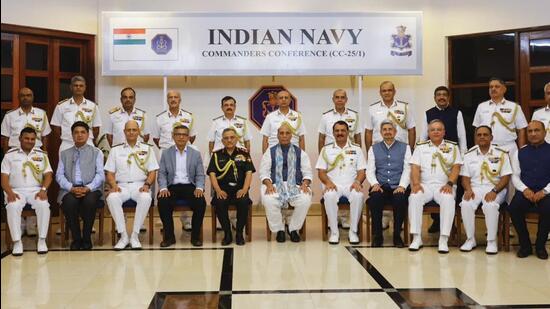Rajnath: India for rules-based order in Indo-Pacific
Defence minister Rajnath Singh on Saturday said that India stands for a free, open and rules-based order in the Indo-Pacific
Defence minister Rajnath Singh on Saturday said that India stands for a free, open and rules-based order in the Indo-Pacific, urging the country’s naval brass to keep track of the “changing circumstances” in the vast maritime expanse and stay prepared for challenges as India has a crucial role to play in the region.

Without naming China, he said that the Indian Navy ensures that no nation in the Indian Ocean Region (IOR) suppresses another based on its “overwhelming economy and military power.”
He inaugurated naval infrastructure worth ₹2,000 crore at Karwar in Karnataka, including berthing facilities for warships and submarines to boost the Indian Navy’s posture in the region.
“Security is an ongoing adaptation process, wherein there is a need to keep assessing, planning, and coming up with new ideas. We need to analyse how India can make its role more effective,” Singh said, addressing the Naval Commanders’ Conference at Karwar. The comments come at a time when China is seeking to boost its influence in the region by setting up military bases, pushing countries to advance its maritime claims and forcing strategic concessions from vulnerable states.
Singh stressed that it was critical to reorient the future role of the armed forces in light of the unpredictable geopolitical landscape. “It is our responsibility to ensure peace and prosperity in the Indo-Pacific as the region has become a focal point for the world,” he said, noting that the 21st century is Asia’s century, and India will have a crucial role to play in ensuring peace and prosperity in the region.
India has consistently called for a free, open and inclusive order in the Indo-Pacific, pivoting on respect for sovereignty and territorial integrity of all nations, while stressing peaceful resolution of disputes through dialogue and under the framework of international laws.
Singh reiterated that India stands for a free, open and rules-based order in the region in accordance with the 1982 UNCLOS (UN Convention on the Law of the Sea).
Singh also flagged off Indian Navy offshore patrol vessel, INS Sunayna, as Indian Ocean Ship (IOS) SAGAR (Security & Growth for All in the Region) for the first time.
The flagging-off of the ship as IOS Sagar, with 44 naval personnel from nine friendly nations (Comoros, Kenya, Madagascar, Maldives, Mauritius, Mozambique, Seychelles, Sri Lanka & Tanzania), marks a significant step in reinforcing India’s commitment to regional maritime security and international cooperation, the ministry said in a statement.
Singh termed the launch of IOS SAGAR as a reflection of India’s commitment to peace, prosperity, and collective security in the maritime domain.
“It is not just related to our security and national interests, but also points towards the equality of rights and duties among our friendly countries in the region. Our navy ensures that, in IOR, no nation suppresses another on the basis of overwhelming economy and military power. We ensure that the nations’ interests are protected without compromising their sovereignty.”
He also inaugurated modern operational, repair and logistic facilities in Karwar under Project Seabird at a cost of ₹2,000 crore. The facilities include infrastructure for berthing ships and submarines, an armament wharf, two piers specifically equipped for refits, marine utility complexes, 480 dwelling units for sailors and defence civilians, and support facilities comprising 25 km of road network, 12 km storm water drainage, water reservoirs, waste management plants and security watch towers.
“The speed at which the work of naval modernisation has been carried out during the past 10-11 years is unprecedented. The induction of new platforms and state-of-the-art equipment has significantly enhanced our naval prowess and the morale of our brave sailors. It is a testimony to the fact that we are always standing with you in your preparations,” the defence minister said.
The second phase of the conference, to be chaired by Navy Chief Admiral Dinesh K Tripathi, will be held in New Delhi from April 7-10. The navy brass will discuss a range of issues pertaining to the service including its modernisation, measures to boost indigenisation, its readiness to address maritime challenges, and safety norms.
The conference will include a special session dedicated to safety, with focus on the actions taken based on the findings of a special task force (STF) set up by Tripathi last year to review safety, security and standard operating procedures of the navy.
The navy chief formed the STF, under a rear admiral, in July 2024 after INS Brahmaputra, a multi-role frigate, tipped over at the Naval Dockyard in Mumbai after a fire broke out on board the vessel, and firefighting units pumped huge quantities of water to douse the flames. A sailor was killed in that accident.
The STF submitted its report last year, and its comprehensive recommendations were promulgated to all naval commands, establishments and units. While it was formed after the INS Brahmaputra incident, it looked into wider safety and security issues.
The conference is being held at a time when the navy is taking steps to be fully self-reliant by 2047, is focused on boosting its capabilities, and is on the verge of making important purchases, including fighter jets and submarines.
The naval commanders will also engage with foreign secretary Vikram Misri on issues related to foreign policy and international engagement, the defence ministry said.






